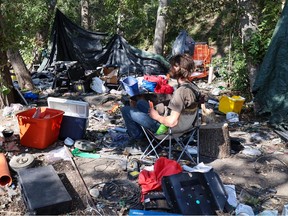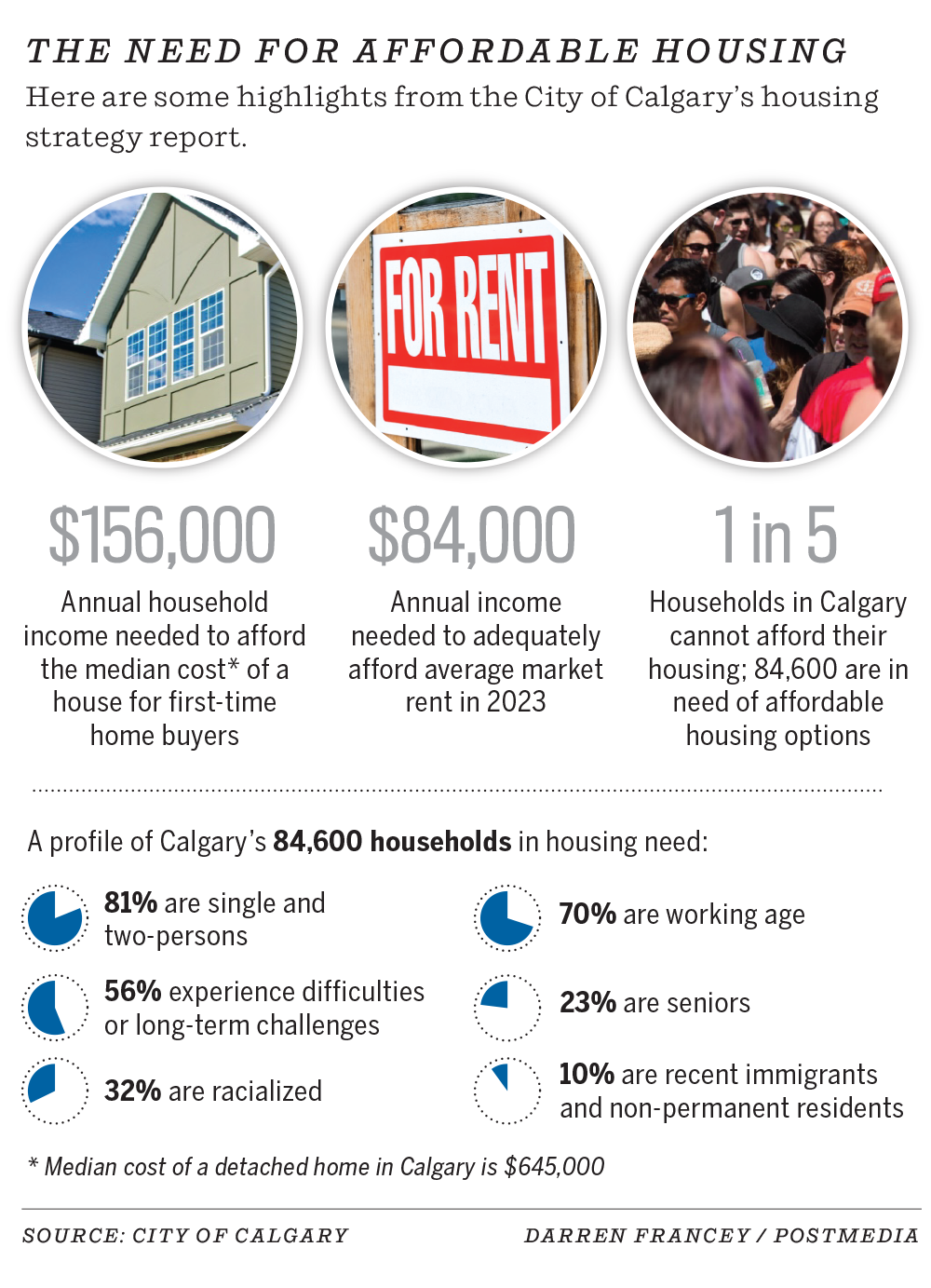'People are scared': Anti-poverty advocates fear homelessness spike amid affordable housing crisis
Advocates say they're seeing increasing 'hidden homelessness' in Calgary: 'We are hearing story after story of overcrowding in housing with family and friends, people sleeping in cars'
Advocates say they're seeing increasing 'hidden homelessness' in Calgary: 'We are hearing story after story of overcrowding in housing with family and friends, people sleeping in cars'
Alberta, has the most “financialization” of real estate in the country, which reduces the amount of available below-market lodging.
Author of the article:Bill Kaufmann
Published Sep 07, 2023 •

Bryce waits knowing that his home, part of a large homeless camp, will soon be cleaned up. The city and province undertook a multi-day project to remove tons of garbage in the camp next to Deerfoot Trail in the Bonnybrook/Manchester area of Calgary on Tuesday, August 29, 2023.
Gavin Young/Postmedia
The minivan and its occupants parked next to what’s normally a happy place could be a bitter harbinger of what Calgary’s affordable housing crisis will bring, said an anti-poverty advocate.
“It was a whole family living in a van beside Riley Park with two kids, bedding down for the night, with mattresses and piles of clothes,” said Meaghon Reid, recounting an evening walk in the northwest Hillhurst area earlier this week.
“If we don’t get this right, we’ll be seeing more of this kind of result a lot sooner than people think.”
The executive director of Vibrant Communities Calgary said the city’s latest Housing Needs Assessment shows nearly one in five households in the city can’t afford lodging comes as no surprise.
Nor do numbers showing that to afford a single detached home, buyers need an income of $156,000 so they wouldn’t be spending more than 30 per cent of their earnings before income tax on housing.
The report also states the median price of a single detached home his risen 37 per cent in the past three years, and that those seeking to rent required an annual income of $84,000, up from $67,000 a year ago.
“Things are desperate, urgent and a lot of people feel helpless,” said Reid, adding housing challenges faced by Calgarians sometimes go beyond money.
“What’s very new is if you had money, you could find a place to live, but now it’s about availability . . . people are scared.”
Advocates hearing ‘story after story’ of overcrowding in housing
There’s no doubt more Calgarians are feeling the financial crunch, a crisis that’s almost certainly under-reported and will only get worse if the housing shortage isn’t addressed, she said.
Last year, Calgary Homeless Foundation’s homeless count was 2,782 — down slightly from four years before — but the number likely doesn’t tell the whole story, said Reid.
“We are hearing story after story of overcrowding in housing with family and friends, people sleeping in cars — there’s a lot of hidden homelessness, which is really telling, and we’re also talking about kids,” she said.
Alberta, she said, has the most “financialization” of real estate in the country, which reduces the amount of available below-market lodging.

Echoing those sentiments is Bernadette Majdell, who helps operate a non-profit real estate developer. She says the city’s homelessness problem is poised to worsen significantly.
“People are making choices on spending on food and utilities . . . but eventually some of those individuals will have to move from existing housing to shelters,” said Majdell, chief operating officer for the HomeSpace Society.
High levels of inflation that have driven up utility costs and interest rates that have been hiked by the Bank of Canada 10 times in the past 18 months have added layers to unaffordability, she said.
After 20 years in the charitable sector, Majdell said, “I’ve not seen anything this bad and it’s not as bad as it’s going to get. It’s going to take money and time to fix.”
Shelter having difficulty transitioning clients into rental market
City officials say the problem is affecting all types of Calgarians, with one demographic conspicuously scrambling to secure elusive lodging this summer: post-secondary students.
If the status quo is maintained, considerably more homelessness “is guaranteed . . . with income security not keeping pace, it is inevitable people will lose their housing and enter experiences in homelessness . . . it’s daunting,” said Sandra Clarkson, executive director of the Calgary Drop-In Centre.
On Sept. 1, a dozen people showed up at the centre due to housing affordability issues, and a traditional autumn increase in client numbers is starting earlier this year, she said.
As the rental housing stock diminishes, it’s become more difficult for her agency to transition clients out of the shelter, which has seen its number of clients rise from 4,416 in 2021-22 to 6,839 in 2022-23, said Clarkson.
Incentives for building more affordable housing are vital, said Clarkson, who raised an idea that’s proven successful in Scandinavia.
“I’d love to see with every development, some affordable housing must be mandatory or it doesn’t get built,” she said.

The minivan and its occupants parked next to what’s normally a happy place could be a bitter harbinger of what Calgary’s affordable housing crisis will bring, said an anti-poverty advocate.
“It was a whole family living in a van beside Riley Park with two kids, bedding down for the night, with mattresses and piles of clothes,” said Meaghon Reid, recounting an evening walk in the northwest Hillhurst area earlier this week.
“If we don’t get this right, we’ll be seeing more of this kind of result a lot sooner than people think.”
The executive director of Vibrant Communities Calgary said the city’s latest Housing Needs Assessment shows nearly one in five households in the city can’t afford lodging comes as no surprise.
Nor do numbers showing that to afford a single detached home, buyers need an income of $156,000 so they wouldn’t be spending more than 30 per cent of their earnings before income tax on housing.
The report also states the median price of a single detached home his risen 37 per cent in the past three years, and that those seeking to rent required an annual income of $84,000, up from $67,000 a year ago.
“Things are desperate, urgent and a lot of people feel helpless,” said Reid, adding housing challenges faced by Calgarians sometimes go beyond money.
“What’s very new is if you had money, you could find a place to live, but now it’s about availability . . . people are scared.”
Advocates hearing ‘story after story’ of overcrowding in housing
There’s no doubt more Calgarians are feeling the financial crunch, a crisis that’s almost certainly under-reported and will only get worse if the housing shortage isn’t addressed, she said.
Last year, Calgary Homeless Foundation’s homeless count was 2,782 — down slightly from four years before — but the number likely doesn’t tell the whole story, said Reid.
“We are hearing story after story of overcrowding in housing with family and friends, people sleeping in cars — there’s a lot of hidden homelessness, which is really telling, and we’re also talking about kids,” she said.
Alberta, she said, has the most “financialization” of real estate in the country, which reduces the amount of available below-market lodging.

Echoing those sentiments is Bernadette Majdell, who helps operate a non-profit real estate developer. She says the city’s homelessness problem is poised to worsen significantly.
“People are making choices on spending on food and utilities . . . but eventually some of those individuals will have to move from existing housing to shelters,” said Majdell, chief operating officer for the HomeSpace Society.
High levels of inflation that have driven up utility costs and interest rates that have been hiked by the Bank of Canada 10 times in the past 18 months have added layers to unaffordability, she said.
After 20 years in the charitable sector, Majdell said, “I’ve not seen anything this bad and it’s not as bad as it’s going to get. It’s going to take money and time to fix.”
Shelter having difficulty transitioning clients into rental market
City officials say the problem is affecting all types of Calgarians, with one demographic conspicuously scrambling to secure elusive lodging this summer: post-secondary students.
If the status quo is maintained, considerably more homelessness “is guaranteed . . . with income security not keeping pace, it is inevitable people will lose their housing and enter experiences in homelessness . . . it’s daunting,” said Sandra Clarkson, executive director of the Calgary Drop-In Centre.
On Sept. 1, a dozen people showed up at the centre due to housing affordability issues, and a traditional autumn increase in client numbers is starting earlier this year, she said.
As the rental housing stock diminishes, it’s become more difficult for her agency to transition clients out of the shelter, which has seen its number of clients rise from 4,416 in 2021-22 to 6,839 in 2022-23, said Clarkson.
Incentives for building more affordable housing are vital, said Clarkson, who raised an idea that’s proven successful in Scandinavia.
“I’d love to see with every development, some affordable housing must be mandatory or it doesn’t get built,” she said.

“This is about forcing us to think about the city we want,” said Meaghon Reid, executive director of Vibrant Communities Calgary.
PHOTO BY SUPPLIED BY VIBRANT COMMUNITIES CALGARY
The situation is dire enough for Mayor Jyoti Gondek to call for a special meeting of council on the issue on Sept. 16, a rare Saturday gathering.
Both Majdell and Reid welcome recommendations in the city’s affordable housing strategy, which includes 33 recommendations from the Housing and Affordability Task Force and another 38 actions already adopted by the city.
Among those recommendations is expanding R-CG zoning to allow for a mix of housing types in residential communities heavily skewed toward single detached zoning.
That would spread affordable housing developments more equally and reduce concentrations that some consider “ghettoization,” said Majdell, adding it would still need public buy-in, something that’s often lacking.
“We see it every time we try to do developments, it’s ‘not here in my backyard’ — there has to be concessions made by the general public,” she said.
“We need all three levels of government to step up, we need people to support the initiative in that strategy.”
RELATED STORIES
The situation is dire enough for Mayor Jyoti Gondek to call for a special meeting of council on the issue on Sept. 16, a rare Saturday gathering.
Both Majdell and Reid welcome recommendations in the city’s affordable housing strategy, which includes 33 recommendations from the Housing and Affordability Task Force and another 38 actions already adopted by the city.
Among those recommendations is expanding R-CG zoning to allow for a mix of housing types in residential communities heavily skewed toward single detached zoning.
That would spread affordable housing developments more equally and reduce concentrations that some consider “ghettoization,” said Majdell, adding it would still need public buy-in, something that’s often lacking.
“We see it every time we try to do developments, it’s ‘not here in my backyard’ — there has to be concessions made by the general public,” she said.
“We need all three levels of government to step up, we need people to support the initiative in that strategy.”
RELATED STORIES

City council narrowly defeats councillor's bid to streamline building approvals

As more people arrive during Alberta's population boom, housing lags behind

Some students in Calgary contemplate homelessness as fall semester begins

Calgary home sales surging, but record-low housing inventory is boosting prices: CREB
‘It’s like you’re penalized for not having enough money to live in another place’
Doni Salazar and her husband have been struggling to find subsidized and affordable housing, last year moving from a low-income unit in the East Village, “where conditions were very bad,” to an apartment in Bridgeland where they pay $900 a month.
But even at that below-market rate, the seniors have little money to spare, said Salazar, who came to Canada with husband, Oscar, from Venezuela in 2012.
“We don’t have any money for entertainment, we pay for our apartment and food,” she said, adding some of the conditions in her building are subpar.
“We are getting less and less for the money we get and it’s so discouraging . . . it’s like you’re penalized for not having enough money to live in another place.”
But in some ways, Salazar said they’re the lucky ones.
“My friend is looking for this same kind of housing and they’re not able to find it — landlords put up a lot of obstacles,” she said.
With so much attention focused on the issue, the next few weeks or months could be a watershed on whether Calgary is able to retain its vibrancy, its younger population and talent, said Reid.
“This is about forcing us to think about the city we want,” she said.
“I think it will be a bit historic.”
BKaufmann@postmedia.com
X: @BillKaumannjrn
Doni Salazar and her husband have been struggling to find subsidized and affordable housing, last year moving from a low-income unit in the East Village, “where conditions were very bad,” to an apartment in Bridgeland where they pay $900 a month.
But even at that below-market rate, the seniors have little money to spare, said Salazar, who came to Canada with husband, Oscar, from Venezuela in 2012.
“We don’t have any money for entertainment, we pay for our apartment and food,” she said, adding some of the conditions in her building are subpar.
“We are getting less and less for the money we get and it’s so discouraging . . . it’s like you’re penalized for not having enough money to live in another place.”
But in some ways, Salazar said they’re the lucky ones.
“My friend is looking for this same kind of housing and they’re not able to find it — landlords put up a lot of obstacles,” she said.
With so much attention focused on the issue, the next few weeks or months could be a watershed on whether Calgary is able to retain its vibrancy, its younger population and talent, said Reid.
“This is about forcing us to think about the city we want,” she said.
“I think it will be a bit historic.”
BKaufmann@postmedia.com
X: @BillKaumannjrn
No comments:
Post a Comment